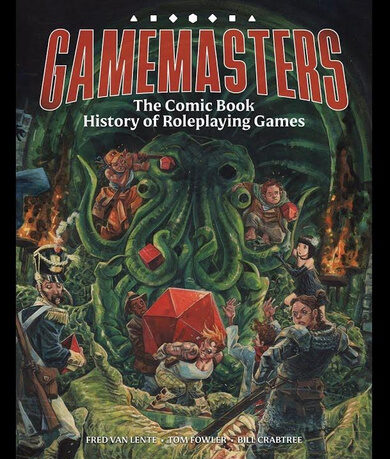We may earn money or products from the companies mentioned in this post.
We all do it. You’re getting ready to play a new game and, unless it’s just a mindless dungeon crawl where the characters aren’t going to talk amongst themselves, the time comes to introduce your character. Maybe the GM wants you to describe to another player who his character sees sitting in the other corner of the bar with his back to the wall. Maybe the PCs have worked together before and already know each other. Whatever the case, it’s time to let the other players know who their characters are adventuring with, so you promptly begin introducing your character sheet:
“My character has a Body of 14…Gimmick is Weird Luck…Skills are Guns +3…WWPHITM? is…”
Some players aren’t quite so blatant:
“He’s an athletic guy…strange things always happen when he’s around…he’s a good shot…kind of looks like…”
But the effect is about the same. The other players get word salad of game stats or an inventory of abilities but when it’s all over they still have no idea who this guy who they’re about to ask to join them on a dangerous journey or who they’ve known for years actually is.
We can do better. Here are a few ideas:
Don’t think of your character as a game character that you’re describing to the other players. Think of him as a character in your favorite TV show or comic book who you’re describing to someone’s who’s never seen or read it.
Get into character. I almost always give players extra Yum Yums if they do the character introduction in first person, especially if they do it as the character describing himself. Sometimes you have to break character to get all the important information across, but playing the character will at least give everyone some idea of what he’s like.
Focus on the big picture. Nobody’s going to remember all your Words and Numbers anyway. Saying “Hannibal is the brains of the operation” is just as meaningful “Hannibal has a Brain of 15, his Job is ‘Leader of the A-Team,’ his Gimmick is ‘I Love It When A Plan Comes Together,’ and he has Skills in Tactics and Strategy.” It’s also a lot shorter and less likely to get lost in shuffle. Don’t worry about giving the other players a full resume, just give them general idea of what your character can do.
Tell the other players why they know things about your character. Instead of telling the others what abilities your character has, tell them how their characters know about a particular ability. For example, instead of saying he’s got the “Drawing” Skill, mention that he’s doodling on the bar napkin or that he’s carrying a sketchbook. Details about what the other characters can see, hear, touch, taste, or smell are more likely to make an impression than lists of what they know. If they wouldn’t know about an ability, don’t mention it. If it comes up in play, they’ll find out.
Describe what the character looks like, not just the WWPHITM?. Mention how the character is dressed, how he wears his hair, whether he has any tattoos or scars, and anything else that gives them a better idea of who they’re dealing with. Sometimes describing the character’s costume or equipment can be an indirect way of letting the others know what he can do. For example, if you mention that he’s carrying a laptop, most players will assume he’s got computer skills of some sort, and a fraternity T-shirt and backwards ballcap is a good way of letting everyone know your character’s a bro. Just don’t let it turn into a dramatic reading of the character’s equipment list. If your character’s stuff is the most interesting thing about him, you need a better character.
Talk about the character’s personality, values, and general attitude. This is especially true if the characters have known each other for a while. While you can get some personality across by doing the introduction in character, there are some things that longtime associates will know that you can’t get across with mannerisms and funny voices. If your character always keeps his word or rants about government abuses of power at the slightest provocation, and the other characters would know that, let the players know.
Describe things that aren’t on your character sheet. Remember that your character sheet isn’t your character (something I plan to talk about in a future post), so it’s perfectly fine to mention things that aren’t written down. While you don’t want to introduce new abilities that really should be on the character sheet (“oh, yeah, and he can fly!”), it’s perfectly fine to describe his love of unmasculine European coffee even if he doesn’t have a “Cappuccino Appreciation” Skill.
Giving the other players and the GM a good idea of what your character’s all about will make it easier for them to understand what role you want him to play in the group and may even be a good way of creating interesting group dynamics right from the start. An inventory of stats, however, isn’t going to do that. Hopefully when you start your next game, these tips will help you introduce your character instead of your character sheet.





